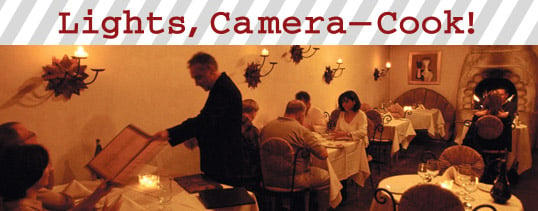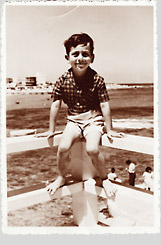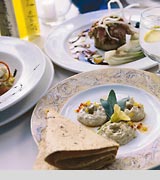
Written by Juliette Rossant, Photographed by Nik Wheeler
Act 1, Scene 1
Los Angeles,
California: |
|
|
 |
|
|
| |
When not in Hollywood—which isn’t too often these days, as he says he won’t accept bad-guy-Arab roles—Chris Maher relishes waiting on his own customers (above) at Momentitos de la Vida, which opened its doors in 1999 in Taos, New Mexico. “You feel you are in a salon,” says one of Maher’s former culinary students, Bill Gerber. |
 |
|
Camera opens on low-angle shot down aisle of 1950’s-style diner. Loud clatter and chatter, indistinguishable from jukebox music. Camera turns to head of COOK [Christopher Maher], salt-and-pepper hair and beard and top of a white T-shirt just visible in opening of short-order kitchen’s window. Head sideways, COOK says as
he puts plates onto window shelves:
[Maher]: Who’s dying? Come on! Pick it up! Pick it up!
WAITRESS [Jennifer Lopez] passes by with coffeepot in hand and pleads for an order:
[Lopez]: Phil! Big Papa, please! I need 15!
COOK leans head out aperture towards disappearing WAITRESS and says, almost to himself, in a fatherly tone:
[Maher]: I love it when you call me ‘Big Papa.’
Moments later, plates are returned unceremoniously by someone else to kitchen window. COOK picks up plate quizzically, shakes it, complains:
[Maher]: What ’s the problem here? It’s hot—it’s hot!
The script is from Enough (2002) by English director Michael Apted, whose movies include Nell (1994) and Gorillas in the Mist (1988). Actor Christopher Maher is playing a cook for the very first time.
Act 2, Scene 1
Taos,
New Mexico: |
|
|
 |
Twilight at candle-lit restaurant in high mountain valley. Band plays southwestern tunes in background. Camera zooms in slowly to lone standing figure. Slow close-up of CHEF/restaurateur [Christopher Maher]. In white shirt, black pants, tinted glasses, CHEF moves around patio, greeting guests. Camera follows CHEF inside. More candles light wooden-beamed ceiling of quiet adobe room. CHEF walks over to couple at low table, presents plate of perfectly grilled shrimp, plump crab cakes and spicy pineapple relish.
|
 |
|
|
A boyhood in Alexandria, Egypt left Maher a wealth of memories—and some of the best of them were of his mother’s and grandmother’s cooking. |
|
|
|
 |
This time the script is Maher’s own, from his four-diamond restaurant Momentitos de la Vida (“Little Moments of Life”) in Taos, New Mexico.
Christopher Maher—chef, restaurateur and Hollywood actor—was born in Egypt as Maher Butros. Although his family left Alexandria when he was nine years old, his face lights at the mere mention of his native country and beams with memories he longs to share—of food.
Maher traces his love of food to his childhood. Both his mother and his grandmother cooked well. At age six, Maher started helping them in the kitchen on the cook’s day off.
During summers spent east of Alexandria in Aboukir, he remembers that his family would buy fresh gray mullet (bouri) directly from the fishermen at the dock and take them to a local bakery to cook. The whole, wet, ungutted fish would first be smothered in wheat chaff to keep it from drying out, then thrown directly onto hot coals. Once well blackened, the fish was dipped in saltwater. Immediately, Maher and his family would eagerly peel away the blackened crust and skin to eat the soft, white flesh within.
Maher also remembers eating fresh blue crabs dropped into a pot of heated water to which generous handfuls of onions and cayenne peppers had been added. Fishmongers would come to his grandmother’s house with baskets of fresh sea urchins. While Maher watched, the fishermen would cut open the tops of each spiny urchin to reveal the yellow, caviar-like roe within.
Even such simple chores as clarifying butter launch Maher into intense food reveries.
“I remember my grandmother would receive a huge shipment of butter. She would carefully sterilize all the jars, then heat the butter gently till it melted. Then she would pour the clear, golden liquid into the jars, and as it cooled, it would slowly thicken and get cloudy, until it was opaque. There would be enough clarified butter for a whole year.”
In the mid-1960’s, Maher’s family left Alexandria for Toronto, and they recreated Egyptian dishes with the ingredients they found in their new home. He recalls his mother’s delight when she discovered that an Egyptian neighbor grew fresh molokhia (mallow), a favorite dish. Otherwise, fresh vegetables were hard to find in the Canada of the 1960’s: Vegetables, he says, were a frozen food by definition.
|
|
| |
Maher buys organic produce from local growers such as Melinda Bateman whenever he can. |
 |
|
While his brother Peter went to medical school in Egypt and second brother, George, went to medical school in Egypt and Canada, Maher found two years of pre-med studies to be enough. In his third year, he tried liberal arts, including an acting class. During his very first rehearsal, he turned to his director and said, “I’m going to be doing this for the
rest of my life.” After he finished at the University of Toronto, his newfound passion drove him to New York in 1978. There he attended the Neighborhood Playhouse School
of the Theatre in mid-Manhattan, alma mater of Gregory Peck, Al Pacino and Diane Keaton, as well as of director Sidney Pollack.
Like most starving actors, Maher also worked as a waiter, in his case in no less prominent a place than Tavern on the Green in New York’s Central Park. But instead of staying in the front of the house, Maher was drawn to the kitchen, where he helped the garde-manger chefs prepare vegetables and make cold salads. At Tavern on the Green, he met restaurateur-to-be Drew Nieporent, who guided Maher-the-foodie through the intricacies of a first-rate professional kitchen, while Nieporent’s mother helped Maher-the-actor get his first talent agent.
Otherwise completely self-taught, Maher began catering at people’s homes until he landed his first major acting role: a year’s stint as the evil assassin Colonel Hashim on the soap opera Another World. In 1982 Maher moved to Los Angeles to pursue motion-picture roles. He changed his name from Maher Boutros to Christopher Maher, but despite the change he was offered only evil-Arab roles.
“I was typecast as a dumb Arab or a bad Arab, one or the other. It depressed me, and I just refused to do any more.”
|
 |
|
|
Part of the restaurant’s Global Fusion menu is a trio of Middle Eastern dips, classics that hark back to his roots. |
|
|
|
 |
To support himself while holding out for better roles, Maher returned to catering. By 1990 he had founded Christopher Michael’s catering, the name reflecting a short-term partnership with Michael Toolin. The catering business thrived, and Maher added a bakery and a café. Eventually, he moved all these, along with a new fine-dining restaurant, into the Pacific Design Center in West Hollywood and received favorable reviews in The Los Angeles Times.
Maher was invited by Creative Artists Agency agent Fred Spektor to teach Saturday-morning cooking classes to actors and producers at Spektor’s home. Bill Gerber, a music and film talent agent who headed Warner Brothers and then formed his own production company, was one of Maher’s students.
“When I was first invited,” Maher says, “I thought, ‘What a weird idea. I don’t even cook for myself, let alone devote that kind of time going to a cooking class.’ The fact that it was in somebody’s home, with nice people, made it more of a social gathering, though, and it really did turn into some very fun, social lunches. We cooked, and then we ate and ate.”
Gerber became a regular at the weekly cooking classes.
“The reason we went so often,” Gerber says, “is because Chris’s personality is very soothing and he enjoys life so much, eating and entertaining. You feel you’re in a salon, and you’re with someone who appreciates friends and the finer things in life.” Gerber and Spektor even threw a party for the launch of Maher’s bakery.
Yet with all his powerful friends in “the business,” Maher never asked for help in getting good roles—indeed, he never told his cooking students he was an actor. He kept his cooking and his acting completely separate.
|
|
| |
This year Momentitos de la Vida won a four-diamond rating from the American Automobile Association, but Maher’s latest dream is a restaurant in Cairo. I would want to appeal to westerners, but most of all I want to bring back what I have learned and give that to Egyptians. |
 |
|
In his mind, though, acting and cooking are closely associated. “Restaurant life is like theater: It’s opening night every night,” Maher says. “We are always ready.”
In the early 1990’s, Maher joined the numbers of Hollywood people who vacationed in Taos, New Mexico, and he eventually built a vacation home there. Then, in 1998, he got a call that an old restaurant in Taos was up for sale. Time was short; a quick decision had to be made. Maher decided to go for it. He managed to sell his bakery and café and his house in Los Angeles, all at a profit, and bought the dilapidated restaurant. It was the single largest financial transaction of his life, with amounts in eight digits—a long way from buying bouri from fishermen in Alexandria. As he restored the Taos restaurant, he shuttered his catering business and finally opened Momentitos de la Vida in January 1999.
“I felt the demand was here for a great restaurant, but it was like I was opening in the wild, wild West,” Maher remembers. He reached out to local farmers to grow vegetables and fruit that would meet his standards, but because of New Mexico’s short growing season, he still had to “import” many of his ingredients from both coasts: “We totally raised the bar.”
He worked his way into the local community and his restaurant won respect and praise. Breathlessly, the Santa Fe New Mexican raved, “There, at Vida, is present-tense vivid: a gestalt of excellence and elegance. This is a playground for the senses, full-on beauty of place matched by exquisite attention to the myriad details of gustatory pleasure.”
Maher has by no means quit acting. He travels to Los Angeles a few times a year for television guest appearances or to try out for a film. After 9/11, he found a number of more interesting and less stereotypical Arab roles. Besides Enough, in which he played an Arab cook and restaurant owner, he has appeared on Fox’s 24, playing a deputy prime minister, and twice on CBS’s The Agency.
The challenge in Los Angeles is to find more “good” Arab roles. The challenge in Taos is to keep the restaurant at the level of excellence Maher demands even when he is not there. With no shortage of young chefs who adore the Taos ski slopes as much as Maher’s kitchen, the Taos challenge is the easier one.
Act 3, Scene 1
Alexandria,
Egypt: |
|
|
 |
Camera opens on elegant restaurant on Alexandria’s newly expanded corniche. Lines of cars roll up to deposit excited diners. Camera follows one family inside, where CHEF/restaurateur [Christopher Maher] greets them with warm, familiar salutations. CHEF sends diners off to their table and waiters to kitchen to return with long trays of mezze à la Maher—Egyptian and Californian appetizers. Close-up on CHEF smiling—at both past and present.
How far off is this script?
“All I know is that I would love to open there,” Maher says. “Everything I make has a touch of Egypt in it, the spices and the palate of the Middle East. I would make everything from risotto to steak and serve terrific mezze. I would want to appeal to westerners, but most of all I want to bring back what I have learned and give that to Egyptians.”
As we taste his mezze, his steak, his risotto, clearly there is something about the spicing, about the boldness of flavors and about the presentation, that is Egyptian. Maybe this script is not too far off.
 |
Juliette Rossant (www.julietterossant.com) is an author and journalist who has written on food and travel as well as business and politics from bases in Istanbul, Moscow, Paris, Jeddah and various us cities. Her first book, Super Chef (May 2004, Simon & Schuster) chronicles the adventures of empire-building celebrity chefs. |
 |
Nik Wheeler (www.nikwheeler.com) has photographed for international publications for more than three decades, and he currently specializes in travel and food. His work for Aramco World and Saudi Aramco World began in the 1970’s, and includes some 20 articles as well as special issues on Central Asia, China and the Silk Roads. |
|
|






